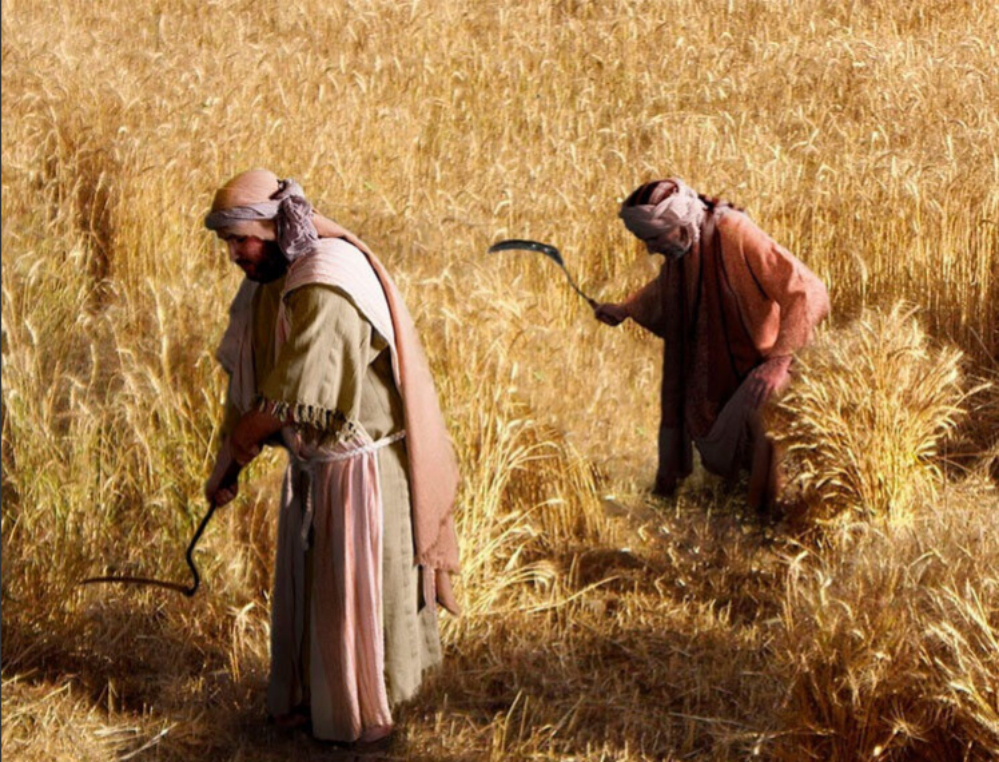4: 1So then, when the Lord knew that the Pharisees had heard that He was making and baptizing more disciples than John 2 (although Jesus Himself was not baptizing; rather, His disciples were), 3 He left Judea and went away again to Galilee. 4 And He had to pass through Samaria. 5 So He *came to a city of Samaria called Sychar, near the parcel of land that Jacob gave to his son Joseph; 6 and Jacob’s well was there. So Jesus, tired from His journey, was just sitting by the well. It was about the sixth hour. There came a woman of Samaria to draw water. Jesus said to her, “Give me a drink.”
Observations
Verse 1-4 We discover in verse 1 that Jesus never performed baptisms, only His disciples. Scripture does not reveal why Jesus never personally baptized His followers. However, we see in 1 Cor 1:12-13 how easily believers had become divided in Corinth over following different church leaders. Therefore, it is plausible that Jesus refrained from baptizing people to prevent future divisions.
When the Pharisees learned that Jesus and His disciples were gaining more followers than John the Baptist, Jesus left for Galilee. The Pharisees became more angry as Jesus’ popularity grew. So Jesus departed for Galilee.
Samaritan Background Samaritans accepted the five books of Moses (the Torah) but rejected the writings of the prophets and all Jewish traditions. They established their temple on Mount Gerizim. They did not believe that the Jerusalem temple nor the Levitical priesthood was legitimate. The Jews viewed the Samaritans as impure, a people who followed a half pagan religion. Jesus saw the Samaritans not as an impure nation, but as a people that needed the gospel so He went directly through Samaria, breaking down this cultural barrier.
Verse 5,6 Jesus came to the city of Sychar, where Jacob’s well was dug. Remember Jacob was was the son of Isaac and wrestled with God throughout the night. God touched Jacob’s hip socket, giving Jacob a permanent limp, which finally caused Jacob to surrender and admit his need for God. This story surrounding Jacob foreshadows a similar struggle of this young Samaritan woman about to meet the Son of God.
Verse 6 tells us that Jesus was tired from His journey and was sitting beside the well. This shows us the humanity of Jesus. He grew tired, hungered and thirsted just like you and I. Because He walked among us, He experienced the same trials and temptations (but never sinned). He understands our struggles and is compassionate towards us and this woman, as we will see shortly.
Jesus then spoke to the Samaritan woman who had come to draw water at the sixth hour. The Jewish day runs from 6am to 6pm. So the sixth hour most likely meant noon. People typically drew water at the end of the day and it would have been a social highlight for a woman. The fact that this woman is coming alone during the heat of the day indicates that she is likely an outcast. We later discover (verse 18) that she is indeed living openly with a man, her sixth in a long series of men. So she may have chosen to go to the well during the heat of the day to avoid other women.
Ignoring her outcast status as well as her gender, Jesus speaks to her. Strict Jewish Rabbis would not dare speak to any woman in public, including their wives, sisters, and daughters. As we can see, Jesus ignores cultural and religious barriers. He doesn’t see an outcast, He sees a woman in need- a woman in need of living water, a Savior.
Application
1.) Timing – Throughout the book of John, Jesus expresses His intent on doing and following the Father’s will. Here we see how timing played a role in Jesus’ ministry. He seems to quite easily change course whenever the circumstances demanded. Often we base our career pathways and life decisions exclusively using our own wisdom and desires.
How would our lives be different if we were to seek God’s will before making decisions? His wisdom far exceeds our own wisdom. Going through life without seeking His direction is like embarking upon a long journey without consulting a single map. Yes, eventually you reach your destination, but one can’t help but wonder how many traffic jams, detours, accidents, and hours of aimless wandering could be avoided if we first consulted the best map, our Father. And I don’t mean sending up a single prayer, asking for a banner in the sky answer. But really seeking Him for days, weeks, or even months. How seriously do you seek His leading?
2.) Sacrifice – John mentions that Jesus was tired. It seems like a mere mention but is it? Think about this. Jesus, who is with the Father in eternity, in perfect paradise, with no decay, no sickness, no sadness, no pain, in perfect communion and relationship with the Father and Holy Spirit, decides to leave all of that in order to become a human being. He decides to wrap Himself in rags called a human body, experiences hunger, exhaustion, sickness, loneliness, betrayal, and yes, even death. He willingly comes to earth to heal, love and serve the very creatures He designed ,who will eventually crucify Him. Most would call that insane. Jesus calls it love.
How much of a role does sacrifice play in your life? How often do you sacrifice your time, money, pride or comfort? The definition of sacrifice is “an act of giving up something of value for the sake of something else regarded as more important or worthy”. Ask God to help you examine how you spend your time and money. It will reveal what you love most and how much sacrifice is a part of your mindset.
Philippians 2 says ” Do nothing out of selfish ambition or vain conceit, but in humility consider others better than yourselves. Each of you should look not only to your own interests, but also to the interests of others.” It is so easy to construct a life around personal pleasures and interests. It takes time, effort and humility to include serving and sacrificing for others. Jesus understands our struggles. He grew weary, just as we do. If He gladly chose surrender, if He gave His life for each of us, should not sacrifice be a dominant theme in our lives?
3.) Prejudice -Humans have been labeling one another since the beginning of time. Pride in the human heart is always looking for a way to look down on a person or group. We quickly judge whether someone is wealthy or poor, intelligent or ignorant, honest or dishonest, hard working or lazy. A critical spirit comes easily from the human heart, but a loving spirit is the work of the Holy Spirit.
The color or ethnicity of the Samaritan woman was not important to Jesus. He saw her true worth and need, and reached out in love. What an example for each of us. Sometimes the most loving thing we can do is simply talk to one another. It is helpful to remember that each person you meet is either carrying a heavy burden or fighting a battle. Jesus knew every burden and battle facing this Samaritan woman and He knows yours as well. He is not waiting in the wings to condemn you. He desires instead to pour out His love and blessing upon your life. Take some time to go to the well and have your own conversation with Jesus. He is always waiting.



